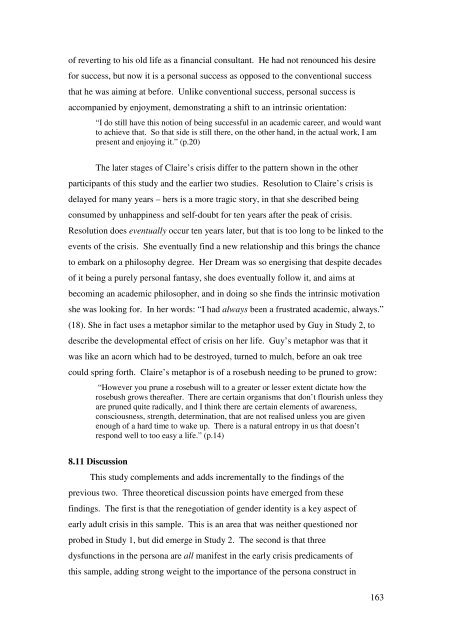DEVELOPMENTAL CRISIS IN EARLY ADULTHOOD: A ...
DEVELOPMENTAL CRISIS IN EARLY ADULTHOOD: A ...
DEVELOPMENTAL CRISIS IN EARLY ADULTHOOD: A ...
Create successful ePaper yourself
Turn your PDF publications into a flip-book with our unique Google optimized e-Paper software.
of reverting to his old life as a financial consultant. He had not renounced his desire<br />
for success, but now it is a personal success as opposed to the conventional success<br />
that he was aiming at before. Unlike conventional success, personal success is<br />
accompanied by enjoyment, demonstrating a shift to an intrinsic orientation:<br />
“I do still have this notion of being successful in an academic career, and would want<br />
to achieve that. So that side is still there, on the other hand, in the actual work, I am<br />
present and enjoying it.” (p.20)<br />
The later stages of Claire’s crisis differ to the pattern shown in the other<br />
participants of this study and the earlier two studies. Resolution to Claire’s crisis is<br />
delayed for many years – hers is a more tragic story, in that she described being<br />
consumed by unhappiness and self-doubt for ten years after the peak of crisis.<br />
Resolution does eventually occur ten years later, but that is too long to be linked to the<br />
events of the crisis. She eventually find a new relationship and this brings the chance<br />
to embark on a philosophy degree. Her Dream was so energising that despite decades<br />
of it being a purely personal fantasy, she does eventually follow it, and aims at<br />
becoming an academic philosopher, and in doing so she finds the intrinsic motivation<br />
she was looking for. In her words: “I had always been a frustrated academic, always.”<br />
(18). She in fact uses a metaphor similar to the metaphor used by Guy in Study 2, to<br />
describe the developmental effect of crisis on her life. Guy’s metaphor was that it<br />
was like an acorn which had to be destroyed, turned to mulch, before an oak tree<br />
could spring forth. Claire’s metaphor is of a rosebush needing to be pruned to grow:<br />
“However you prune a rosebush will to a greater or lesser extent dictate how the<br />
rosebush grows thereafter. There are certain organisms that don’t flourish unless they<br />
are pruned quite radically, and I think there are certain elements of awareness,<br />
consciousness, strength, determination, that are not realised unless you are given<br />
enough of a hard time to wake up. There is a natural entropy in us that doesn’t<br />
respond well to too easy a life.” (p.14)<br />
8.11 Discussion<br />
This study complements and adds incrementally to the findings of the<br />
previous two. Three theoretical discussion points have emerged from these<br />
findings. The first is that the renegotiation of gender identity is a key aspect of<br />
early adult crisis in this sample. This is an area that was neither questioned nor<br />
probed in Study 1, but did emerge in Study 2. The second is that three<br />
dysfunctions in the persona are all manifest in the early crisis predicaments of<br />
this sample, adding strong weight to the importance of the persona construct in<br />
163
















